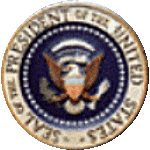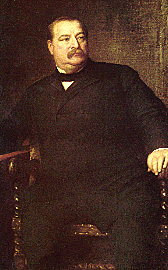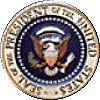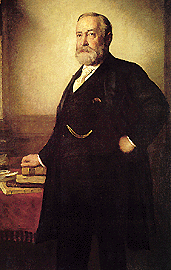Presidents 22-24


Grover Cleveland

No man had a swifter rise to the presidency than Grover Cleveland. A lawyer in
Buffalo, New York, Cleveland had held only one political office in his life
before being elected mayor of Buffalo in 1881. But he so successfully reformed
the corrupt government of that city that New York Democrats nominated him for
governor in 1882. Cleveland easily won the governorship, and continued his
reforms to the state level. The Democrats soon realized that the popular
crusading governor could make a winning presidential candidate.
Cleveland's opponent in the 1884 presidential election was Republican James
Blaine. Cleveland won the election by a very narrow margin. He was the first
Democrat to win the White House since James Buchanan was elected in 1856.
Cleveland was a hard-working President who did his best to reform the federal
government. He vetoed hundreds of congressional bills that he thought wasted
government money.
Benjamin Harrison challenged Cleveland for the presidency in 1888. Cleveland
won more popular votes, but Harrison won in the electoral college. When the
time came to leave the White House, First Lady Frances Cleveland told the
servants that they would be back in four years. Her prediction came true. In
1892, Cleveland defeated President Harrison and became the only President ever
to have two nonconsecutive terms of office.
Unfortunately, a depression hit the nation early in Cleveland's second term.
The President was unable to improve the economy. He soon lost popularity with
both the public and his party.
Cleveland retired to Princeton, New Jersey, where he served as lecturer and
trustee at Princeton University. By the time of his death at age 71, he had
reclaimed his reputation as a supporter of honesty in the government.

William Henry Harrison

The grandson of President William Henry Harrison, Benjamin Harrison resisted
comparisons with his grandfather. "I believe every man should stand on
his own merits," he would insist. Throughout his life, Benjamin Harrison
commanded respect for his bravery in battle and for his honesty in political
office. While President, he supported several important new laws.
Benjamin Harrison was an Indiana lawyer and politician. During the Civil War
he commanded a company of Indiana volunteers and rose to the rank of general.
Harrison had a reserved personality, yet was a brilliant speaker. In 1881, he
was elected to the Senate and in 1888, the Republicans chose him as their
presidential candidate.
The main issue of the election was tariffs: Grover Cleveland advocated lower
tariffs, Harrison called for high tariffs. Cleveland won more popular votes
than Harrison, but Harrison received more votes in the electoral college and
won the presidency.
Harrison made good on his promise to support high tariffs. The McKinley Tariff
Act of 1890 created the highest tariffs in American history. The prices of
many goods rose as a result. He also passed the Sherman Anti-Trust Act,
designed to curb the growth of monopolies, and the Sherman Silver Purchase
Act, which helped farmers and small businesspeople by increasing the amount of
money in circulation.
Harrison also supported the growth of the navy, and encouraged American
involvement in international conferences. Harrison's administration was one of
the first to recognize the role of the United States as a world power.
Harrison did not much enjoy the presidency, but he campaigned for reelection
out of a sense of duty to his party. Harrison's wife, Caroline, died of
tuberculosis two weeks before the election. After the death of his wife,
Harrison found that the loss of the presidency to Grover Cleveland "had
no sting in it."
Harrison retired to Indianapolis. There he resumed his law practice and, in
1896, married Mary Dimmick, his first wife's niece. He died of pneumonia on
March 31, 1901.

Grover Cleveland
Grover Cleveland served a second term as President here. See above for more
information!

All images of Presidents are courtesy of whitehouse.gov
Information taken from Software titled "American Heritage The History of
the United States for Young People.
The copyright belongs to: Forbes
Inc. and Byron Preiss Multimedia Company. Thank You!

Washington, Adams, Jefferson
Madison, Monroe, Adams
Jackson, Van Buren, Harrison
Tyler, Polk, Taylor
Fillmore, Pierce, Buchanan
Lincoln, Johnson, Grant
Hayes, Garfield, Arthur
Cleveland, Harrison, Cleveland
McKinley, T. Roosevelt, Taft
Wilson, Harding, Coolidge
Hoover, F. Roosevelt, Truman
Eisenhower, Kennedy, Johnson
Nixon, Ford, Carter
Reagan, Bush, Clinton
Bush, ????, ????
|

|
All graphics and
pages are copyright © 1997 - 2008 Pages 4 Ever
(except where noted). Do not take, copy, steal, plagiarize or use in any
way, shape or format without the express written permission of Pages
4 Ever.
Some backgrounds and graphics made from clipart acquired from ArtToday, Boxed Art,
friends, my own imagination, and/or
graphic CD collections that I have purchased. If you find anything on this site
that you have copyright to, and can prove it, please let me know and I will
gladly either remove it or place a link back to you, whichever you prefer.
If you should find any broken links, please drop us a line and let us know the
exact URL the broken link is on. Thank you.
|

|
![]()



